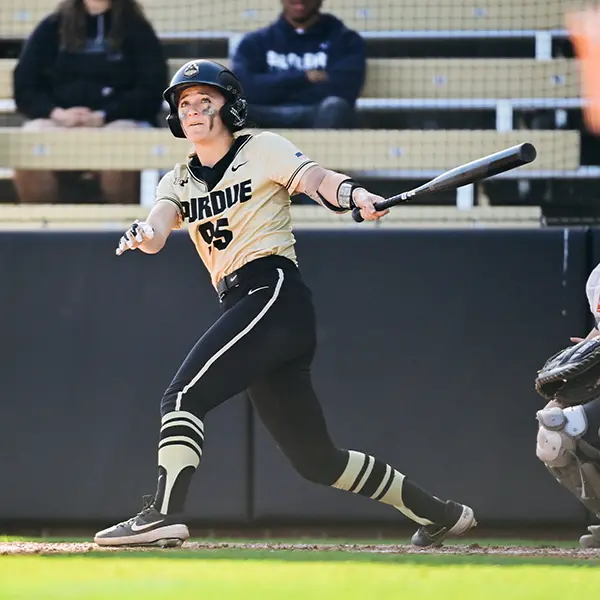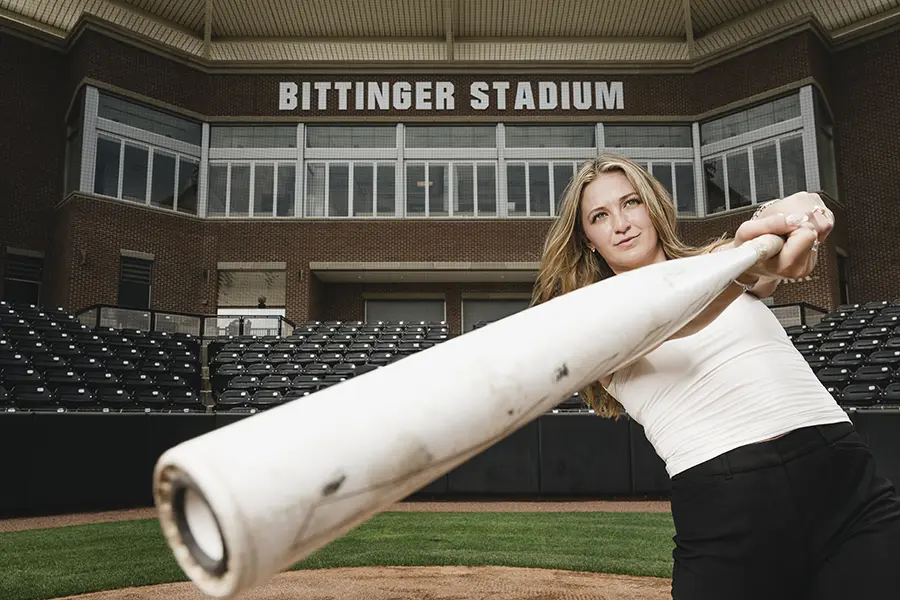
Softball is a sport that is both physical and analytical.
If anyone understands the power of both sportsmanship and analytics, it’s Kiara Dillon (MSBA ’24). Captain of the women’s Boilermaker softball team in her junior year, she also graduated with a bachelor’s in economics and business management. In her senior year, the center fielder won an athletic leadership award and earned her master’s degree in business analytics.
Dillon played and started in all but one game in each of her sophomore, junior and senior seasons. With 31 hits in her junior season and a .406 on-base percentage, she led the team and ranked fifth in the Big Ten in stolen bases (20-for-22 on the season).

In her senior year, Dillon scored 22 runs, held a .372 on-base percentage, stole 12 bases on 15 attempts, and had a .982 fielding percentage. She recorded only two errors the whole year in the field.
Dillon began playing at age 12, spending weekends on the diamond. When evaluating colleges, sports programs were at the forefront of her mind. With “a family bloodline that runs deep into Purdue,” she considered Purdue for its academics, facilities and resources. She came into Purdue with 16 credits she earned in high school, ready to play and ready to tackle the challenges of studying at the business school.
“You can’t come into Purdue and fail. They’re going to set you up for the most success of your life,” says Dillon. But she didn’t shy away from any challenges. She credits her economics class, though tough, with giving her “a good perspective of what goes on in the business world.” After taking it, she declared her major in economics and graduated within three years.
With another year of NCAA eligibility, Dillon took great care in choosing her master’s program.
“I looked at marketing, communications, business analytics and business administration. I thought with all the AI stuff coming up, let’s see what [business analytics] can do,” says Dillon. “I’m glad I chose it. It opened my perspective to all the sides of business. I plan on going to law school next.”
With a glint in her eye and wry smile, Dillon put her career goals into a humorous but high-achieving light.
“Do you watch Suits? I want to be Harvey Specter.” She may have been kidding, but she has reason to have the fictional corporate attorney’s level of confidence. Not only did she earn two degrees in four years, she was an Academic All-Big Ten and Boiler Student Athletic Advisory Council (SAAC) President. She also worked with athletes on NIL (Name, Image and Likeness) – she leveraged NIL for yoga sessions at a local studio.
Name, Image, and Likeness (NIL) rights give student-athletes the ability to receive compensation for their personal brand. Historically, NCAA rules championed "amateurism" that prohibit "pay-for-play," which prohibited student-athletes from earning money through endorsements or other commercial activities. However, mounting legal and public pressure, including the Supreme Court's unanimous 2021 ruling in NCAA vs. Alston, triggered significant changes that continue to evolve.
After the Court's ruling, the NCAA adopted an interim policy allowing student-athletes to profit from their NIL without jeopardizing their college eligibility. Various state laws and court rulings had challenged the NCAA’s restrictions, highlighting the need for a more equitable system.
The NIL policy shift has transformed the landscape of college sports, providing athletes with new opportunities to monetize their notoriety. Student-athletes can now engage in activities such as signing endorsement deals, launching their own businesses, and leveraging social media for sponsored content. This change not only empowers athletes financially but also encourages them to develop their personal brands and entrepreneurial skills.
As the NIL regulations continue to develop, university leaders, NCAA administrators and lawmakers are calling for federal legislation to create consistent rules nationwide. Meanwhile, universities are offering resources to help athletes navigate contracts and financial opportunities responsibly. The NCAA continues to support student-athletes by offering resources and educational materials through NCAA NIL Assist.

Dillon chose the online Business Analytics program in part for the convenience it offered around her busy softball schedule.
“We’re on the road a lot. I found that, similar to my classmates in my online program who have full-time jobs, playing a college sport is like a full-time job,” says Dillon. Her classmates often worked until 6 o’clock; she had practice till 6.
“We’re on the road a lot. I found that, similar to my classmates in my online program who have full-time jobs, playing a college sport is like a full-time job.”
Dillon began each week by laying out her entire schedule from 8 a.m. to 10 p.m., marking where she’d go to study, what she’d study, when it was due, and when she’d fit in yoga, training, and a side job. She started with reviewing the lectures and taking notes. Her variables included finding times to meet with her project team partners in the evenings and asking teaching assistants or faculty to look at problems that she found tough to solve. She worked with the TAs in nearly every class to ensure she was achieving excellence.
One of her favorite courses was negotiations, where she could excel because of her experience from her years of playing on softball teams.
“Negotiations come into play with the team environment where I say ‘we have to do this’ to 30 girls with different personalities, and people taking things different ways. It gave me a unique perspective, how we can delegate based on strengths and weaknesses and by having open-ended conversations.”
She also loved her courses on spreadsheet modeling — “I’m on an Excel kick right now!” — and intellectual property law, both of which she knew would come into play with her goal of corporate law and business. But she’s such an enthusiastic learner that even her project management course presented her with an opportunity to put her knowledge to use. She approached her brother, who works at her family’s construction company, offering to use her spreadsheet skills to help the family business.

“Overall, I have a business personality at heart. Having that well-rounded degree in management, understanding the finance, understanding the marketing, understanding all the different edges of business really helps my future.”
These spreadsheet skills came into play when she looked at NIL data from Purdue athletes. “We built this big Excel document showing who was utilizing NIL, which sports and how much they were making,” says Dillon. She worked with fellow softball player and MSBA student Kate Claypool. They shared a goal: “How can we better set up the athletes?”
“Looking at the data for football versus softball, they’re completely different, but we found common ground and where we can grow,” says Dillon.
What’s telling about her work with NIL is how she applies her newly polished business skills in a leadership capacity. She loves finding ways businesses can help her just as she can help them.
“Overall, I have a business personality at heart,” says Dillon. “Having that well-rounded degree in management, understanding the finance, understanding the marketing, understanding all the different edges of business really helps my future.”